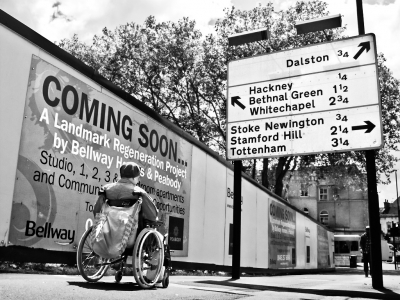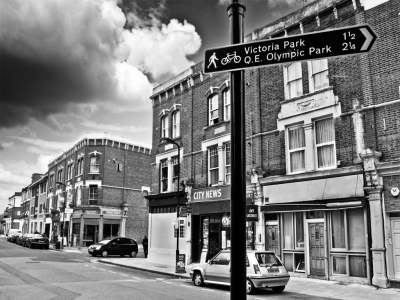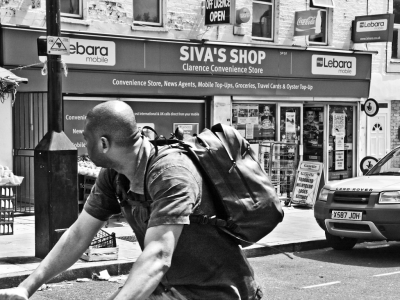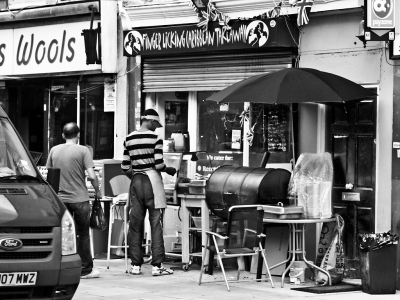Out of Hackney Downs station, the day is spinning into life. The old lollipop man stands on the kerb outside Brook Community School. A flash of yellow neon, bright eyes, white teeth. His head turning left, turning right, both feet forward, across.
He holds his lollipop in front of him, high like a mitre. Children hurry past, their shouts circling above him. In the middle of the tornados of decibels, he stands still, as calm as a prophet.
Everything turns.
Under the bridge, the five lanes of traffic meet, three roads coming together to make an awkwardly shaped star. Dalston Lane curves sharply first, leaving behind the dressed-up flats sitting next to the run-down taxi office. A few people leak out of them, satchels strapped across designer labels. Then the lane bends, its throat dry, towards the Pembury Tavern.
Amhurst Road crosses here too, another path veering violently off course. Twisting down like a river, its source is a mile away at Stoke Newington, but its mouth is at Hackney Central, by a Turkish mezze bar and a branch of Marks and Spencer.
The morning crowds flow over the pelican crossings, their eyes before their feet.
The only road that comes away cleanly moves towards the north-east. It follows the 56 route to the Lea Bridge Road Roundabout, and everything widens and quietens here. Drivers watch the lights, red, amber, green, their hands tight on the wheel. Ahead, all is silent in the universe.
The buildings that hug Pembury Road are brown, solid, made of brick. They stretch up five storeys, and have red slanting roofs. They have two chimneys each, a little nod towards rural England. No smoke comes from them, or fire.
On the side of Elham House, the red paint is still glistening. At one corner, the colour comes together in the shape of a little girl. Her body is loose on a swing, happy and playful. Underneath her is the shadow of what happened last summer. The violence has been changed by a paintbrush, transformed into something else. Something ageless, longing, a little hopeful.
The moon is still low in the sky. There are no people in its soft light.
Going right when the Downs come, the estate’s northern periphery stretches out. A fading poster is tacked onto a noticeboard for a Senior Citizens pampering day. August 13th, it says. The Saturday after the riots. It curls at the corners, just like the model’s perfect hair.
The sun starts to come out, sparkling the tar on the pavement into different constellations. Out of the back of Sheppey House, two teenage boys swagger. One is tall and wiry, the other short and small-boned. They mumble to each other, biting their zips between their teeth.
The taller boy laughs after a moment, and the zip falls from his lips. He hits his friend’s stomach with the flat of his hand. He catches my eye, scratches his head, then smiles back.
“You OK?” He stares, brazenly. “Fine, thanks,” I laugh back. The smaller boy raises an eyebrow my way, his chubby face part-confusion, part-empathy. He adjusts his hood, then his friend does, two East End grandpas fiddling with their flat caps. Their little limbs shrug and whirr past; little meteor showers.
Going right again, Clarence Road beams on down.
So much has changed since I lived around the corner. Back then, I lived in Clapton Square, a middle-class black hole in the middle of Hackney’s messy galaxy. I go by there briefly just to see it, pass the children in the playground. Different-coloured faces scream and squeal around the new see-saw, the grass, the green hut, but the girls on the swings, pushed by their mothers, are white.
On a bench around one of the trees, a young woman and young man hug each other tightly-tightly-tightly. The girl wears a jade-green scarf around her head and small shoulders. Her eyelashes, thick with eyeliner and mascara, shadow eyes shiny with water. The boy’s face is buried, hidden fast, in her shoulder. He wears a black sweatshirt, old jeans, green and white trainers.
I sit watching them for five minutes. The girl stares intensely into the distance. The boy, hidden from the world, doesn’t move. They say absolutely nothing to each other.
I don’t say anything either.
I never used to walk down Clarence Road.
To get to Hackney Downs station, I would take another route. Cross the square, feel the sun through the leaves, cut through the side of St John’s Church, then emerge at the St Augustine’s Tower, the little shadow of 1608 that now overlooks Primark. Its history and longevity, just like Sutton House nearby, gave me a strange sort of comfort.
But then I found out that the church behind it was torn down and sold, nearly two hundred years ago. That dead bodies decayed inside it when it was a mortuary. Today, in its fifth century of watching Hackney living and dying, it sits next to the old town hall, now a Paddy Power betting shop.
We orbit each other, obliviously, so often bypassing everything.
Back on Clarence Road, the takeaways and newsagents are opening up. A man calls over to two sisters on the other side of the street. He crosses it, and scoops up the smaller girl into the crook of his arm. He tickles her chin, making her curly hair shake, her body giggle. He carries her back over to Finger Licking Caribbean, pops her onto the counter, and I watch her legs swing. The lights on her trainers glitter like comets.
A few doors up, Siva stands outside the front door of his shop talking to a customer. I know his name, and his shop, only from the television and the internet. He wears a polo shirt, old jeans, and a half-smile on his face.
He walks back in, and his newsagents looks different to last summer, but also somehow the same. A father and his daughter buy a packet of crisps and a milkshake. An old man, long grey beard and a walking stick, buys the Hackney Gazette. I hand over a pound coin for a can of Diet Coke and a Fudge. I want to say something. I just smile, say thanks, and move on.
Two posters thanking the local community are still stuck to the window, two pieces of paper that still seem to be necessary. Two refusals to forget that a couple from Clapton Square, relocated to New York, started a fund for a man they used to see every day, a man whose name they confessed they had never even known.
I see two rectangles of white facing the Pembury Estate, and remembering the supernova of Hackney last summer. All the energy exploding outwards, outshining the galaxy around it, before it left a trail of fire and light, a memory fading away.
Eclipses don’t have to happen. We can cross each other’s arcs. We can look around, forget we are even here, and the world keeps on turning.





